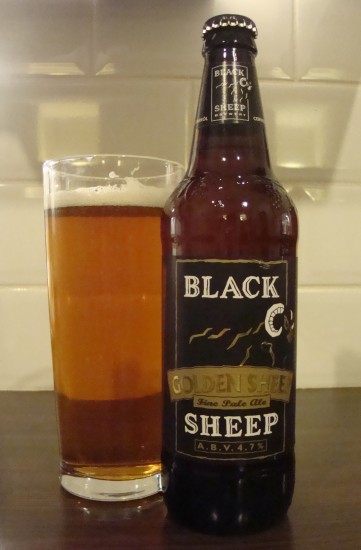Last year, Jeff, Andrew and myself sat out on the back stoop of the Dove doing our usual thing – drinking a few pints of foaming nut brown ale while concocting plans of what we could or should attempt next. We’ve always liked talking about beer. Liked drinking it a bit more than that if truth be told. So we thought we’d start a CBTR beer section. An ongoing conversation about ale, if you will. Hopefully it’ll be sporadic yet seasonal, informative yet slightly sozzled. It’ll be a bit like that conversation we had that day in fact.

Black Sheep Brewery’s Golden Sheep by Roger Clapham
The Black Sheep Brewery in Masham, deep in rural North Yorkshire, has been producing quality beers since only surprisingly recently. Paul Theakston (formerly of Yorkshire brewing stalwarts Theakstons until the Scottish & Newcastle takeover in the 1980’s) set up the place in 1992 in an old maltings building looking out on the River Ure, using mostly reclaimed brewing equipment from all over the North of England.
Very much swimming against the tide in the early 1990’s, the brewery produces a range of beers in a traditional manner, using their old-fashioned equipment and techniques, along with the Yorkshire Dales water the locals swear by. For this, they have duly won numerous awards – you can check their website for a better look inside their trophy cabinet. Their beers are available in some the better pubs in and around Yorkshire & the North-East, and they are also venturing further afield – I recently found their best bitter in a village pub in Cambridgeshire, and dutifully necked some of it.
The relatively well known Black Sheep Ale is now a staple of a number of supermarket beer aisles, and if you ever happen across their Yorkshire Square Ale you should get a pint of it without hesitation – it won the world’s best premium bitter only last year. That said, I’ve elected to write about their Golden Sheep pale ale here – a lighter brew that’ll wash down a treat regardless of the outside temperature.
Being a golden ale you get the slight whiff of citrus and the bitter taste you’d expect, but it has a wholesome dryness about it too. Not too sweet either, so goes down with ease, even if you’re planning on having a few. On a full-on session the cask version (at 3.9%) would be a doddle even if you were drinking it all afternoon. You’d more than likely be alright with the bottled version too (4.7%) – but do have some pork scratchings at least. As a bonus, like many beers from smaller scale traditionalist brewers, any resultant hangover should only be mild at worst, if not entirely absent (assuming you’ve not gotten carried away, believing yourself to be the owner of a better-functioning liver than is truly the case).
You’d be best suited having a pint or two of it after a springtime walk across some suitably rolling northern hillsides, but failing that a couple before your Sunday roast would do very nicely indeed. Enjoy it. Cheers…